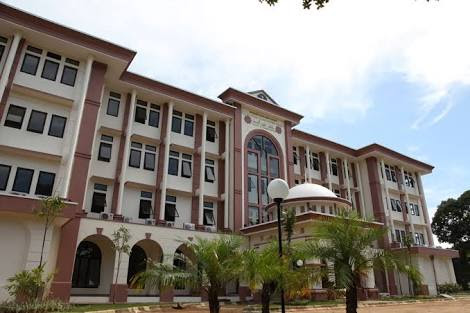THE IMPLEMENTATION OF THE PROBLEM-BASED LEARNING MODEL BASED ON TORAJA CULTURE IN MATHEMATICS LEARNING
PENERAPAN MODEL PROBLEM-BASED LEARNING BERBASIS BUDAYA TORAJA DALAM PEMBELAJARAN MATEMATIKA
Abstract
This research aims to implement Toraja cultural-based mathematics teaching tools to enhance the learning outcomes of students at SMPN 1 Makale Selatan. The objectives include assessing students' learning outcomes, their activities, and the teacher's capability in applying Toraja cultural-based mathematics teaching tools. The research method employed is quantitative research. Based on the findings, students' learning outcomes through problem-based learning (PBL) models infused with Toraja cultural elements are categorized as very high, with an average score of 86.17. This success is attributed to the cultural relevance and emotional connection fostered by the PBL approach integrated with Toraja traditions. The inclusive learning environment created through the recognition of cultural diversity further contributes to positive outcomes, confirming the effectiveness of the Toraja culture-based PBL model in promoting active student involvement in the learning experience. The integration of Toraja cultural elements into the PBL model significantly contributes to the remarkable success in achieving a high average score of 86.17 in students' learning outcomes. This achievement is found due to the contextual relevance of Toraja cultural values, increased emotional engagement, and the development of critical thinking skills within a broader cultural context. The use of Toraja culture not only enhances memory retention but also empowers students to actively participate in a learning environment that celebrates cultural diversity. The exceptional learning outcomes affirm the efficacy of integrating PBL with Toraja cultural elements, providing students with a profound and meaningful educational experience.
Downloads
References
Abdulrahim, N. A., & Orosco, M. J. (2020). Culturally responsive mathematics teaching: a research synthesis. The Urban Review, 52(1), 1–25. https://doi.org/10.1007/s11256-019-00509-2.
Ardianti, R., Sujarwanto, E., & Surahman, E. (2022). Problem-based Learning: Apa dan bagaimana. Diffraction, 3(1), 27–35. https://doi.org/10.37058/diffraction.v3i1.4416.
Djamarah, Bahri, S., & Zaini, A. (2000). Strategi belajar mengajar. Jakarta: Rineka Cipta.
Karkkainen, R., & Rasanen. (2019). Mathematics education in the Finnish comprehensive school. ZDM Mathematics Education, 50(5), 745–765.
Naresh, N. (2015). A stone or a sculpture? It is all in your perception. International Journal of Science and Mathematics Education, 13, 1567–1588.
Ozofor, N. M., & Onos, C. N. (2018). Effect of ethnomathematics on senior secondary school students’ achievement in Ikwuano local government area, Abia State. Researchjournali’s Journal of Mathematics, 5(1), 1–14.
Pannen, P. (2005). Pendidikan sebagai sistem. Jakarta: Depdiknas.
Rahmawati, Y. (2015). Peranan kompetensi profesional guru pendidikan agama islam dalam meningkatkan hasil belajar peserta didik di SMA Negeri 1 Batanghari Lampung Timur. IAIN Metro.
Rusliah, N. (2016). Pendekatan etnomatematika dalam permainan tradisional anak di wilayah kerapatan adat koto tengah kota sungai penuh propinsi Jambi. Proceedings of The International Conference on University-Community Engagement, 715–726.
Sarwoedi, S., Marinka, D. O., Febriani, P., & Wirne, I. N. (2018). Efektifitas etnomatematika dalam meningkatkan kemampuan pemahaman matematika siswa. Jurnal Pendidikan Matematika Raflesia, 3(2), 171–176. https://doi.org/10.33369/jpmr.v3i2.7521.
Silalahi, M. (2018). An ethnobotanical study of traditional steam-bathing by the Batak people of North Sumatra, Indonesia. Pacific Conservation Biology, 25(3), 266–282. https://doi.org/10.1071/PC18038.
Trianto. (2010). Model pembelajaran terpadu, konsep, strategi, dan implementasinya dalam KTSP. Jakarta: Bumi Aksara.
Wijayanto, Z., & Retnaningsih, R. (2019). Considering students’ prior knowledge in culture-based contextual learning media application: how effective it is to support students’ mathematics learning outcome. Indonesian Journal of Mathematics Education, 2(1), 14–19.
Wulandari, I. (2017). Model Pembelajaran kooperatif tipe STAD (student teams achievement division) dalam pembelajaran MI. Jurnal Papeda: Jurnal Publikasi Pendidikan Dasar, 4(1), 17–23. https://doi.org/10.36232/jurnalpendidikandasar.v4i1.1754.
Copyright (c) 2024 Suri Toding Lembang, Nurdin Arsyad, Bernard

This work is licensed under a Creative Commons Attribution 4.0 International License.

